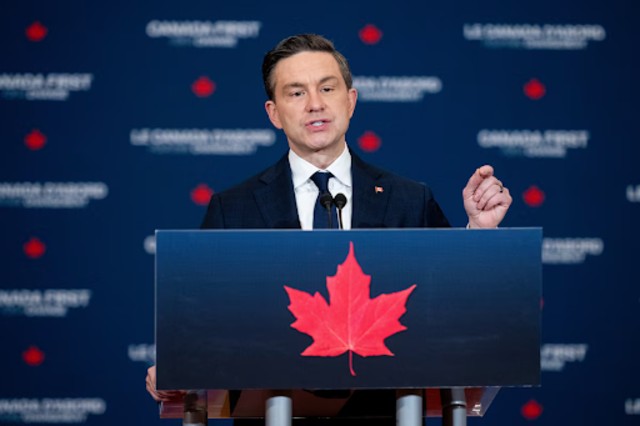
Conservative Leader Pierre Poilievre speaks at a press conference in Ottawa on April 13. The Canadian Press
Conservative Leader Pierre Poilievre has promised to make significant changes to the ethics rules for elected officials if his party forms the next government. His plan aims to ensure greater transparency, accountability, and stricter penalties for violations. Poilievre wants to end what he calls “shadow lobbying” by making anyone advising the government with a financial interest register as a lobbyist.
Poilievre’s plan includes increasing fines for ethics violations to $10,000. He described his vision as the “Accountability Act 2.0,” which would close loopholes in current rules that allow people like Mark Carney and the Liberals to avoid responsibility. Poilievre wants to tighten the Federal Accountability Act, passed during Stephen Harper’s time as prime minister.
One of the key components of Poilievre’s proposal is requiring cabinet ministers to fully divest from tax havens and disclose their assets to the Ethics Commissioner. Non-compliance would result in penalties. He also vowed to eliminate the practice of "blind trusts," claiming that these are not truly blind to the public. Instead, ministers would have to sell all their assets, convert them into cash, and give the cash to a trustee who would manage the investments without the minister’s knowledge.
Poilievre also criticized the current ethics legislation, which allows politicians to make decisions that benefit themselves or their families if the decision also helps others. He argued this provision is often abused and that the Conservatives would impose stricter guidelines. Under the new rules, ministers would be banned from making decisions that could benefit their personal interests more than the public’s. Any potential conflicts of interest would have to be declared publicly and approved by the Ethics Commissioner.
Under Poilievre’s plan, anyone running for office would need to disclose where they paid taxes in the last seven years. Party leaders and prime ministers would also have to disclose their assets within 30 days of assuming their position.
Poilievre's announcement is seen as a direct challenge to Liberal Leader Mark Carney, who has been under pressure to disclose his assets and potential conflicts of interest. Carney, who once chaired Brookfield Asset Management, has said he follows ethics rules and has no conflicts of interest. He also announced plans to set up conflict-of-interest screens with the Ethics Commissioner but refused to publicly declare his financial holdings, claiming they were in a blind trust.
Poilievre criticized Carney’s handling of relations with U.S. President Donald Trump, though he acknowledged the tariffs were solely Trump’s fault. When asked who would lead negotiations with Trump if he became prime minister, Poilievre said he would announce his foreign minister and cabinet after the election.
In a separate development, the Conservatives accused the Liberals of trying to discredit them. They claimed that Liberal operatives planted “Stop the Steal” buttons at a conservative networking event. Liberal campaign spokesperson Kevin Lemkay confirmed the reports, saying that some buttons had been created by Liberal campaigners but were not meant to be part of their official campaign material.















